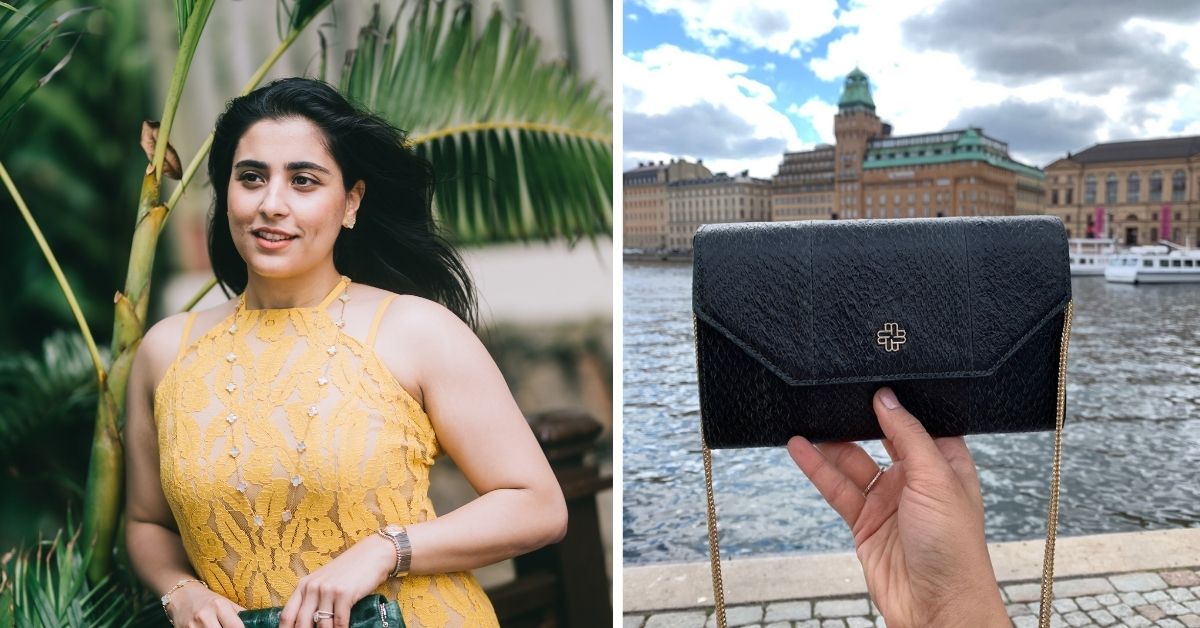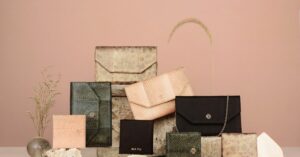Solapur Girl Makes Leather from Waste Fish Scales, Showcases Designs at Global Runways
Meet Mayura Davda Shah, who quit her job in the engineering industry to build MAYU, a sustainable fashion brand that makes eco-friendly leather handbags and other products from waste fish skin.

Thanksgiving (2015), Iceland. Mayura Davda‐Shah, who was on a break and visiting the country with her friends, was strolling through local markets. At one store, in particular, something caught her eye — a bracelet.
Upon inspection, she found out that this was no ordinary piece of jewellery. She didn’t know it then, but what she would learn next would one day turn into an idea for a business empire.
Inspired by that very moment, Mayura, who hails from Solapur, today runs MAYU, which creates elegant and sustainable accessories that have made their way to the ramps of Paris and Hungary.
Navigating a slippery slope in the business world
Mayura recalls that when she first saw the bracelet, she thought it might be made from exotic material. The store owner told her that it was, in fact, made of discarded fish skin.
“I learned from the locals that the ‘leather’ of the bracelet was made sustainably from salmon skin. The skin came from fish processing units located nearby,” she tells The Better India.
While this was new to Mayura, using fish skin as leather has been commonplace in Nordic culture for centuries. The 30-year-old’s aim is to introduce this concept to India, where the animal hide is usually the more popular option for bags and accessories.
Mayura quit her job in the engineering industry to start MAYU in 2018, with handbags made from salmon and wolfish skin as her focus.
Explaining her transition from her engineering roles to being a creative director at the venture, she says, “Although I pursued my studies, and had an early career, in science and engineering, what helped me stand out was my passion for out-of-the-box creative thinking and applying it even on the most technical job at hand.”
She adds that at MAYU, they do not feel compelled to design and create with every changing fashion season. “We chose accessories and handbags as our primary product category so that our offerings are not limited to seasons or sizes.”

MAYU has to tackle two main challenges to use discarded fish skin for its range of products. One is the dimensions of the fish skin, while the other is the consistency, she explains.
“Animal hide leather usually comes in large sizes from the processing units. These are given to brands, who then have a lot of room to play around with designs. With fish skin, however, the sleek dimensions of 15 cm x 10 cm are a limitation.”
This was when the entrepreneur thought of getting many fish skins together and stitching them into panels. This in turn would create a large canvas that would give her room to play around with designs.
The second, Mayura says, was to figure out how to work with the consistency of fish skin.
For this, she came up with a plan to repurpose the loose edges and byproducts that were obtained during the stitching process into filler boards. These would be inserted into the bags to give them shape.
Mayura says that some of the fish leather that they use is hydrophobic, and is thus used to make waterproof bags. However, she adds, fish leather ages the same way as animal leather, and should be cared for in similar terms.
The processing of the fish skin into viable strips is done by a supplier in Europe. Meanwhile, artisans from Chennai stitch these strips into panels, and then, the final product.
A venture rooted in sustainability
Mahak Chaudhary, who handles the marketing for MAYU, says, “We are focused on sustainability not only in our products but also operations. We operate at a zero-waste-certified facility in Chennai, which is also a certified ‘white’ category factory by the Pollution Control Board of India. This essentially means that our operations do not pollute the air, water or the environment in any way.”
She adds that the biodegradable waste of the factory is converted into fertilisers through a bioprocess.
Along with sustainability, the brand also believes in uplifting women through their work. “Our production team comprises over 90 per cent women from underrepresented and underprivileged backgrounds,” says Mayura.
“The leather industry sees a majority of male workforce, and as a woman-led brand, we aim to change this,” she adds.

The main idea that MAYU centres its efforts around is coming up with products that are not only good from a sustainable standpoint, but also ones that look high-end and classy. “Gone are the days when you had to compromise sustainability for beauty and functionality or vice versa,” she notes.
MAYU’s handbags have even reached international fashion runways, including the Global Sustainable Fashion Week in Budapest, Hungary (February 2020), and Tranoi Paris (September 2019). The brand also retails internationally, with its major markets being in Europe and North America, Mayura says.
While their hit products are the Laia Crossbody Bag, the Aurora Wallet on Chain, and the Liva Pouch, you can browse through a wide selection, which retails for Rs 500 going up to Rs 90,000.
The venture is self-funded and has witnessed a growth of 10 per cent year on year since its inception, says Mayura.
True to the idea they started out with, MAYU is constantly on the lookout for waste products from the food industry that they can channel into materials for accessories.
The brand also has a vegan line of bags, pouches and phone cases made from Piñatex™, which is an innovative natural textile from the byproduct of pineapple leaf fibres. They are also on their way to coming up with an alternative leather by using a certain type of fruit (the details of which they do not wish to indulge at this point) in the next quarter.
To check out the range of products they retail or to order your handbag, click here.
(Edited by Divya Sethu)
If you found our stories insightful, informative, or even just enjoyable, we invite you to consider making a voluntary payment to support the work we do at The Better India. Your contribution helps us continue producing quality content that educates, inspires, and drives positive change.
Choose one of the payment options below for your contribution-
By paying for the stories you value, you directly contribute to sustaining our efforts focused on making a difference in the world. Together, let’s ensure that impactful stories continue to be told and shared, enriching lives and communities alike.
Thank you for your support. Here are some frequently asked questions you might find helpful to know why you are contributing?


This story made me
-
97
-
121
-
89
-
167













